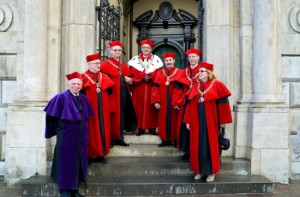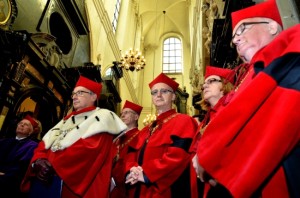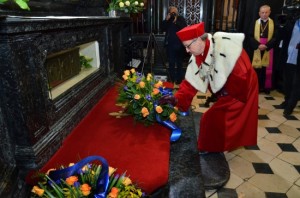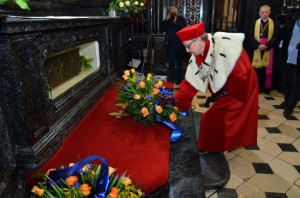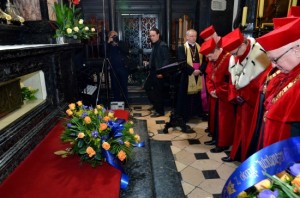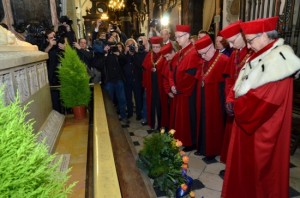- 10
- May
- 2014
- in Reports
Jagiellonian University honours its founders at the Wawel Cathedral
On 12 May the Jagiellonian University celebrates its most important occasion – the anniversary of its foundation by King Casimir the Great in 1364. This years celebrations began in the Wawel Cathedral on 10 May. The University authorities – Prof. dr hab. med. Wojciech Nowak, JU Rector, Vice-Rectors, former Rectors (Prof. Karol Musioł and Prof. Franciszek Ziejka), Chancellor, Bursar and representatives of students and graduates placed flower bouquets in JU colours on the tombs of the University's Founders: King Casimir the Great, Queen Jadwiga and King Vladislaus Jagiełło.
At 9.00 a.m., to the sound of tolling of the Sigismund Bell and the voices of Wawel Cathedral Mixed Choir, a Holy Mass the Jagiellonian University academic community began. It was concelebrated by Kraków Metropolitan Archbishop, Cardinal Stanisław Dziwisz. During the mass, the Rector donated to the Cathedral a replica of the University seal from 15th century.
After the mass, the JU authorities and rectors of Polish and international higher education institutions formed a procession, which set off from the Cathedral to the JU Auditorium Maximum through Kraków streets to attend the JU Senate Session.
In 1364, after many years of endeavour, King Casimir the Great received permission from the Pope to establish a university in Krakow, the capital of the Kingdom of Poland. It was the second university to be founded in Central Europe, after Prague in 1348. Soon afterwards other universities were established in the area: in Vienna (1365), Pécs (1367), Erfurt (1379) and Heidelberg (1386).
However, the Studium Generale in Krakow, as the school was then called, started functioning practically only in 1367. It consisted of three faculties only: liberal arts, medicine and law, as Pope Urban V did not grant permission to establish a faculty of theology, regarded as the highest ranking discipline. Similarly, he refused to grant such a permission to the Universities of Vienna, Pécs and Erfurt.
The University was most probably given accommodation at the Royal Castle on Wawel Hill. King Casimir's premature death in 1370 and the total lack of interest in the University demonstrated by his successor, King Louis of Anjou (King of Poland and Hungary), led to its gradual collapse.
The University (or the Academy, as it was called then) was restored owing to the endeavours of Queen Jadwiga, who pleaded its case with the Pope in Avignon and later bequeathed her personal effects to the University, which was re-established in 1400, after its benefactress's death. Henceforth it was a full medieval university, consisting of four faculties. As it followed the pattern of the University of Paris, its Rector was elected by the professors only. Colleges with accommodation for the professors and dormitories for students were founded.
fot. Anna Wojnar
